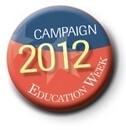Charlotte, N.C.
Want to meet a 16-year-old who has strong opinions about the testing provisions in the No Child Left Behind Act? (And not for self-interested reasons?) Look no further than Calvin Philips, a high school student from San Francisco and a member of the Junior Statesmen Foundation, which has taken 50 students from around the country to the Democratic National Convention for a political education.
Philips has taken an interest in education policy ever since he began tutoring K-5 English-language learners in his community, and became frustrated with what he called the pressure the various standardized tests under NCLB placed on his students. He said the idea of “teaching to the test” has soured him on the law, and he hopes for change in future versions.
He also views the political excitement in Charlotte as a refuge and a contrast to the usual attitudes about politics he sees around him: “It’s really a haven for (those of) us who are frustrated with the apathy we see today.”

The nonprofit Junior Statesmen Foundation, part of the Junior State of America organization, focuses on civic education and participation to prepare students for life in a democracy. Its activities include summer school at various universities in the United States and abroad, focusing on history, government, and public speaking. The foundation, based in San Mateo, Calif., and founded in 1934, also acts throughout the year to bring together opinions and ideas from high school students nationwide.
Not surprisingly, the 50 statesmen and stateswomen at the convention have had an exciting time, said Charlie Herron, the student services coordinator for the foundation.
“These are pretty wonky kids,” said Herron, noting that they come from various backgrounds (although not from each of the 50 states).
Philips, for example, said he was particularly captivated by U.S. Sen. Kay Hagan, D-N.C., for what he called her professional attitude and dignity during a tough campaign in 2008. But he said his best experience so far was seeing former U.S. Secretary of State Madeleine Albright speak at an event discussing arts education, which I’ll be writing about later.
The participants have also met with political types ranging from lobbyists to professors in an effort to broaden their knowledge about the American political system, Herron said, as they get ready to go to the polls for the first time. And in addition to the headline issues of jobs and the economy, according to Herron, the students know that, “Education policy plays a huge role.”
